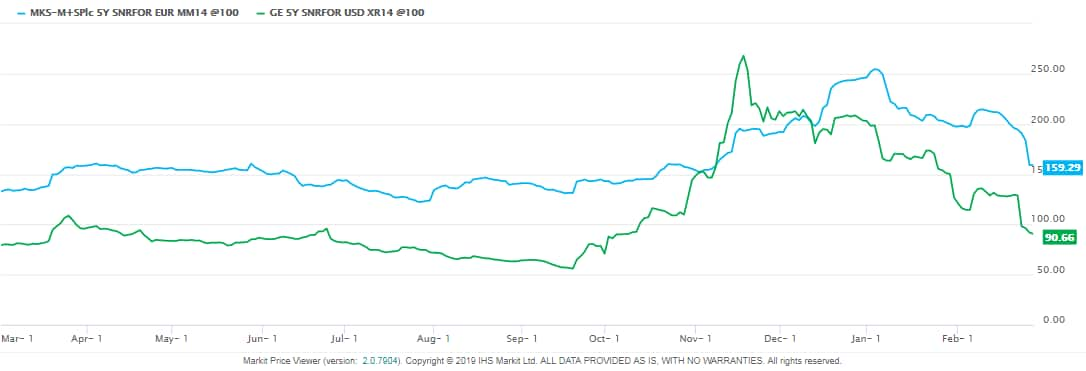Customer Logins
Obtain the data you need to make the most informed decisions by accessing our extensive portfolio of information, analytics, and expertise. Sign in to the product or service center of your choice.
Customer Logins
CREDIT COMMENTARY
Mar 01, 2019
Bondholders enjoy their day in the sun

Seasoned credit investors are painfully familiar with shareholder-friendly actions. Leveraged buyouts, debt-financed share buybacks and special dividends can all deliver nasty surprises to bondholders.
But idiosyncratic risk works both ways and companies can implement policies that favour bond investors, much to the chagrin of equity holders. Marks & Spencer is a good example. The UK retailer announced that it was creating a joint venture with Ocado to sell its groceries online, paying a princely sum of £750m. Media reports rightly focused on the seemingly high price paid by M&S - more than 40 times earnings. But the sharp fall in the share price was caused by how the deal was financed, as well as concerns about the lofty valuation.
M&S has relatively high leverage for an investment grade name (rated Baa3/BBB-), leaving it little room for manoeuvre to avoid fallen angel status. Hence it decided to fund the deal largely through a rights issue and a dividend cut - a financial policy that is never going to endear management to shareholders.
Nonetheless, it is music to the ears of bondholders. The balance sheet will be strengthened, alleviating short-term concerns about a downgrade to junk, and the venture fills the glaring online gap for M&S. CDS spreads in the retailer rallied 24bps to 159bps and they have now recovered all of their spread widening that occurred during the broad sell-off in Q4 last year.
Perhaps this is a harbinger of things to come. It has been widely noted that the proportion of debt rated BBB as a percentage of total investment grade debt is at its highest for several years, leaving mandated investors vulnerable. But companies on the cusp of high yield have the tools to defend their ratings, as long as they are prepared to strengthen their balance sheets and offend shareholders in the process.
The interests of bond and shareholders are not always opposed. General Electric's recent performance demonstrates that the two sets of investors can sometimes share the benefits of a shift in financial policy. The company announced measures - including eliminating the dividend and asset sales - to shore up its position and avert the risk of further rating downgrades (currently rated Baa1/BBB-). Given that GE's future would be threatened by continued credit deterioration - GE Capital funds through commercial paper - a credible turnaround strategy would be welcomed by both bondholders and shareholders, regardless of the short-term pain for the latter. GE's 5-year CDS has tightened from 268bps in November to the current level of 91bps, while the stock price is up over 40% this year.
A more accommodative stance from the major central banks evident in recent weeks could well extend the current credit cycle and delay the inevitable rise in default rates. But credit investors should be screening for financial policy shifts among the more fragile BBB names - idiosyncratic risk can generate alpha for long positions as well as protection buyers.
S&P Global provides industry-leading data, software and technology platforms and managed services to tackle some of the most difficult challenges in financial markets. We help our customers better understand complicated markets, reduce risk, operate more efficiently and comply with financial regulation.
This article was published by S&P Global Market Intelligence and not by S&P Global Ratings, which is a separately managed division of S&P Global.
{"items" : [
{"name":"share","enabled":true,"desc":"<strong>Share</strong>","mobdesc":"Share","options":[ {"name":"facebook","url":"https://www.facebook.com/sharer.php?u=http%3a%2f%2fwww.spglobal.com%2fmarketintelligence%2fen%2fmi%2fresearch-analysis%2fbondholders-enjoy-their-day-in-the-sun.html","enabled":true},{"name":"twitter","url":"https://twitter.com/intent/tweet?url=http%3a%2f%2fwww.spglobal.com%2fmarketintelligence%2fen%2fmi%2fresearch-analysis%2fbondholders-enjoy-their-day-in-the-sun.html&text=Bondholders+enjoy+their+day+in+the+sun+%7c+S%26P+Global+","enabled":true},{"name":"linkedin","url":"https://www.linkedin.com/sharing/share-offsite/?url=http%3a%2f%2fwww.spglobal.com%2fmarketintelligence%2fen%2fmi%2fresearch-analysis%2fbondholders-enjoy-their-day-in-the-sun.html","enabled":true},{"name":"email","url":"?subject=Bondholders enjoy their day in the sun | S&P Global &body=http%3a%2f%2fwww.spglobal.com%2fmarketintelligence%2fen%2fmi%2fresearch-analysis%2fbondholders-enjoy-their-day-in-the-sun.html","enabled":true},{"name":"whatsapp","url":"https://api.whatsapp.com/send?text=Bondholders+enjoy+their+day+in+the+sun+%7c+S%26P+Global+ http%3a%2f%2fwww.spglobal.com%2fmarketintelligence%2fen%2fmi%2fresearch-analysis%2fbondholders-enjoy-their-day-in-the-sun.html","enabled":true}]}, {"name":"rtt","enabled":true,"mobdesc":"Top"}
]}




